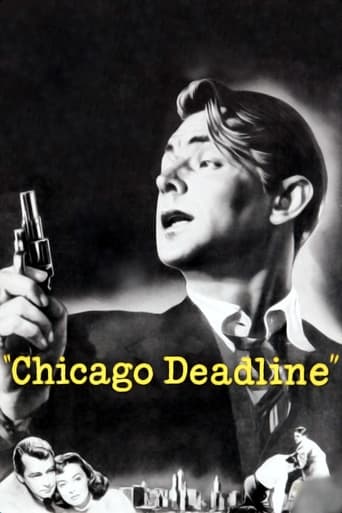JohnHowardReid
An unusual film in that the stars Ladd and Reed never meet. She is dead when the film opens and her story is told entirely in flashbacks. Unfortunately the flashbacks are all rather dull and needlessly hold up the exciting present-day action with Ladd tangling with gangsters, though even in the contemporary sequences there is too much dialogue and not enough action and the scriptwriters seem unsure as how Miss Reed actually ties in with the present-day events (Ladd gives a perfunctory explanation at the climax which convinces no-one). It has a promising idea, but the script never really lives up to its promise. Many of the ideas here were worked up much more grippingly by Richard Brooks in Deadline USA. Lewis Allen's routine direction doesn't help either, nor does some obvious process screen work. In fact, production values are very moderate by "A" standards, and it's odd to find a Victor Young score attached to a film of this class. Ladd is fairly forceful, though his diminutive size is a handicap, but Miss Havoc looks far too old as his soul-mate (her character as written and played is highly ambiguous) and Miss Reed is rather colorless and unexciting for someone who causes all the present-day excitement. Shepperd Strudwick struggles manfully with another ambiguous characterization, while Berry Kroeger is rather blankly sinister as the gangster. Gavin Muir lets slip his opportunities and gives a superficial portrayal. Despite her prominence in the cast, Irene Hervey has only a small part (notice Marie Blake from the Dr Kildare series back in her accustomed post as a switchboard operator). The best players are Willock, Powers, and Vermilyea.
parusia1936
I have seen this excellent movie in 1951 in Barcelona/Spain when I was 20 and I liked it then and continue to like now very much, I considered it one of the greatest noir classic movies in history. Alan Ladd is fantastic in his role as a reporter; Donna Red is beautiful and had great performance in his playback roll, as Arthur Kennedy and the rest of the cast. is a pity that original seams lost. I have a copy of a VHS from a Honolulu TV, but it can be watched pretty well. the story is very well done by writers Warren Duff and Tiffany Thayer, and the development of the history very well done by director Lewis Allen. Alan Ladd one of my preferred actors is superb and I had said all the cast specially June Havoc, beautiful and charm-ant actress. the end of the movie remains on your mind as one of best ends of a movie in Hollywood history. I highly recommend for the be-lovers of noir classics.
Alex da Silva
Reporter Alan Ladd (Ed Adams) outrageously interferes with things when he steals an address book from the room in which Donna Reed (Rosita) is found dead. He retraces her life by contacting the people in this address book and a few people get bumped off along the way.Unfortunately Donna Reed hasn't led a very interesting life so God knows why anyone would show any interest in pursuing her address book, especially as her death is not at all suspicious. Alan Ladd is obviously a weirdo.A lot of time is spent on the telephone in this film. It's just blah blah blah on the blower! Still, the film is OK even if you can't follow the cast of thousands. Alan Ladd sums things up for you at the end with a synopsis of what has just happened. But he delivers it at breakneck speed so it doesn't really help. It's a vehicle for Alan Ladd and it's all a bit pointless.
bmacv
Reporter Alan Ladd stumbles across a strange woman, dead of tuberculosis in a seedy Southside hotel. Her address book, however, hints at a wild and well-connected past. (The girl, with the improbable moniker of Rosita Jean D'Ur, is played in flashback by the improbable Donna Reed.) Ladd's quest, as any noir quest should, takes him up and down the intricate layers of Chicago society, through some of which his tour guide is society dame June Havoc, who plays it with panache. This downfall of a good kid with some bad breaks begins to obsess Ladd, and Chicago Deadline (it's been remarked) could almost have been a grittier Laura set not in high society but on cusp where shabby respectability meets the demimonde. But the cunning Vera Caspary (who wrote the novel Laura) is alas nowhere in evidence, so Chicago Deadline becomes almost an object lesson in Edmund Wilson's dictum that the heavy atmospherics in detective fiction are rarely justified by the conclusion. Nonetheless, for most of its running time, Chicago Deadline is a dark and haunting ride.


